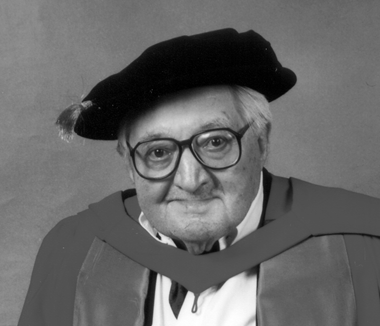Macquarie University NSW 2109
Recognising contributions to research
The Moyal Medal is awarded annually by Macquarie University for research contributions to mathematics, physics or statistics – the areas of research of the late Professor José Enrique Moyal.

Professor José Enrique Moyal was Professor of Mathematics at Macquarie University for five years from 1973 to 1977.
Joe Moyal (Jerusalem, 1 October 1910 – Canberra, 22 May 1998) was one of Australia’s most remarkable scientists. His insight into the interaction between mathematics, physics and statistics led him to make contributions to these disciplines which have had far-reaching ramifications in all three fields. The Moyal formalism which he introduced in 1949 is being developed today in physics as the Moyal quantum mechanics.
Born and raised in Palestine under the British Mandate, he went to France to study and then work in electrical engineering. He moved to Cambridge to study mathematics, and then returned to Paris to study statistics and theoretical physics.
During the first years of the Second World War, he worked for the British on a secret project together with French scientists in Paris. As the Germans were invading Paris, he could see that this material would come under enemy hands, so co-opted some French troops who were passing by to help him destroy the equipment and records, except some which he smuggled back London. Following this, he worked for de Havilland on aircraft design, often taking frequency measures aloft, squashed in the cockpit of developmental fighter planes.
After the war, he started an academic career as a mathematical physicist in Belfast and a statistician in Manchester. At this time, he made fundamental contributions to both fields, introducing the Moyal bracket into physics, and developing the foundations of stochastic processes.
Moyal came to Australia in 1958 and worked for six years in the Department of Statistics at the Institute of Advanced Studies of the Australian National University in Canberra. There, he trained several graduate students who are now eminent professors in Australia and the United States. He also made fundamental contributions to the theory of population processes, enabling researchers to track population size and the characteristics of individuals.
He extended this work at the Argonne National Laboratory near Chicago, where he worked from 1964 to 1973 on the peaceful uses of nuclear energy. Following this, he returned to Australia to spend five years as a Professor of Mathematics at Macquarie University. Following his retirement, he went back to Canberra where he maintained his interest in the fundamental questions of science. In 1997, the Australian National University conferred on him the honorary degree of Doctor of Science, stating that “he is one of a diminishing breed of mathematical scientists working in a broad range of fields, in each of which he has made fundamental advances”.
Moyal was also an adventurous scuba diver and an avid wine connoisseur. A more detailed picture of him appeared in the book Breakfast with Beaverbrook by the distinguished historian of science, Ann Moyal, whom he married in 1963. Jose Enrico Moyal died in Canberra in 1998.
The Moyal Medal is awarded annually by Macquarie University for research contributions to mathematics, physics or statistics.
- 2000: Joe Gani (Statistics – Australian National University)
- 2001: Gerard Milburn (Physics – University of Queensland)
- 2002: Alan McIntosh (Mathematics – Australian National University)
- 2003: Terry Speed (Statistics – UC Berkeley and WEHI Melbourne)
- 2004: Denis Evans (Physics – Australian National University)
- 2005: Bob Anderssen (Mathematics – CSIRO Mathematical and Information Sciences)
- 2006: Eugene Seneta (Statistics – University of Sydney, Department of Mathematics and Statistics)
- 2007: Peter Drummond (Physics – University of Queensland, Department of Physics)
- 2008: Alan Carey (Mathematics – Australian National University)
- 2009: Peter Hall (Statistics – University of Melbourne and the University of California, Davis.)
- 2010: William D Phillips (Physics – National Institute of Standards and Technology in Gaithersburg MD)
- 2011: Cheryl Praeger (Mathematics – School of Mathematics and Statistics, University of Western Australia)
- 2012: Annette Dobson (Statistics – School of Population Health, University of Queensland)
- 2013: Donald Melrose (Physics – School of Physics, Sydney University)
- 2014: Richard Brent (Mathematics - Australian National University)
- 2015: David Balding (Statistics - University of Melbourne and UCL Genetics Institute London)
- 2016: Sir Michael Berry (Physics - University of Bristol, UK)
- 2017: Prof Hinke Osinga (Mathematics - University of Auckland)
- 2018: Prof Noel Cressie (Statistics - University of Wollongong)
- 2019: Prof Margaret Reid (Physics - Swinburne University of Technology)
- 2020: Prof Amnon Neeman (Mathematics – ANU)
- 2021: Professor Louise Ryan (Statistics - UTS)
- 2022: Professor Halina Rubinsztein-Dunlop (Physics - University of Queensland)
- 2023: Professor Kate Smith-Miles (Mathematics - University o f Melbourne)
- 2024: Professor Alan Welsh (Statistics - Australian National University)